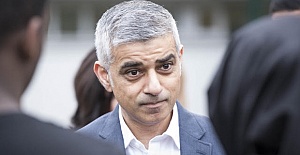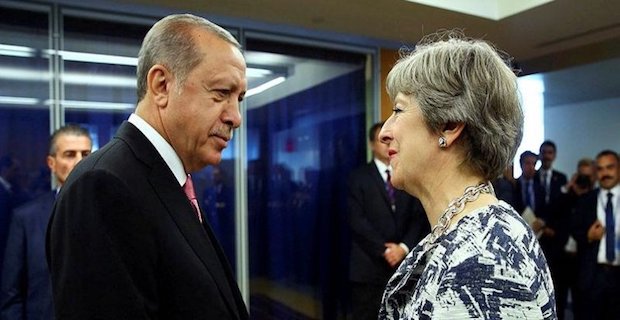As the U.K. government has proven to be unprepared for Brexit, this could serve as a vast opportunity for developing relations with non-EU states like Turkey, experts said.
According to Seckin Baris Gulmez, an assistant professor of international relations at Izmir Katip Celebi University, Turkey and the U.K. have been experiencing parallel situations in their relations with the EU, despite technically different processes.
Turkey applied for EU membership in 1987 while accession talks began in 2005.
As for the U.K., it is set to leave the EU in March 2019 but a final deal to shape future U.K.-EU relations has yet to be agreed upon.
“Comparably, it seems that neither of the countries will totally get what they want from the EU,” Gulmez told in an email interview.
“It shows that both countries will get closer to each other while getting away from the EU in a harsh way,” he said.
The talks between Turkey and the EU stalled in 2007 due to the objections of the Greek Cypriot administration in the divided island of Cyprus, as well as opposition from Germany and France.
Pointing out the friendly relations between Turkey and the U.K. for almost a century, Gulmez said both countries were of the opinion that “bilateral relations independent from the EU” would be beneficial.
Expressing hope for improved Turkey-U.K relations, Gulmez, highlighted that the U.K. was now in search of potential partners in the post-Brexit period.
“In this context, I believe that the Brexit process is a significant opportunity for Turkey to improve bilateral relations [with the U.K.] and gain a position against the EU,” said Gulmez, who recently worked on Turkish-British diplomatic relations.
It seems that Turkey would not miss that opportunity. As unveiled in the country's 100-day action plan, it aims to strengthen trade and economic ties with the U.K. in the post-Brexit period.
-Referendum without ‘alternative roadmap’
The British public opted to leave the EU in a 2016 referendum, ending the country’s 44-year-long membership with the bloc. Talks with the EU on the conditions of leaving the bloc began on June 2017.
According to Gulmez, the latest resignations in the Conservative Party in July was evidence that the British government was unprepared for Brexit.
Last month, Boris Johnson resigned as foreign secretary over disagreements with Theresa May and her Chequer’s Plan that sets out the U.K.’s relationship with the EU after Brexit.
Two vice chairs of the ruling Conservatives jumped ship following Johnson’s resignation, citing similar reasons.
“They couldn’t filter the determination of the public for Brexit till the very last moment,” said Gulmez.
Emre Gonen, an academic from the International Relations Department at Istanbul Bilgi University, puts the blame for the Brexit hurdle in the U.K. on the lack of an “alternative road map”.
“The main problem is that the Tory government organized the referendum without having an alternative road map,” Gonen said.
It led to difficulties in establishing a negotiating stance before the European Commission, which has “an experienced negotiator”, according to Gonen.
“This has created a very asymmetric situation where we see the parade of negotiators and politicians of the U.K. desisting one after the other, practically because they see the fragility of their stance,” he added.


 After Nesil Caliskan a by-election will be held in Jubilee ward in Enfield
After Nesil Caliskan a by-election will be held in Jubilee ward in Enfield Publishing the analysis, Labour’s Cllr Ergin Erbil said Everybody in Enfield deserves basic rights
Publishing the analysis, Labour’s Cllr Ergin Erbil said Everybody in Enfield deserves basic rights Gaza-Israel conflict Statement from Cllr Ergin Erbil, Leader of Enfield Council
Gaza-Israel conflict Statement from Cllr Ergin Erbil, Leader of Enfield Council Cllr Ergin Erbil was elected as the new Leader of Enfield Council
Cllr Ergin Erbil was elected as the new Leader of Enfield Council Sustainable Development and ESG, Will This Become the Course for Turkic World
Sustainable Development and ESG, Will This Become the Course for Turkic World Thousands evacuate Santorini as more earthquakes strike island
Thousands evacuate Santorini as more earthquakes strike island Rauf Raif Denktas and Dr. Fazıl Kucuk II. International Cyprus Studies
Rauf Raif Denktas and Dr. Fazıl Kucuk II. International Cyprus Studies We continue our promotional activities in Europe, primarily in the UK said Ahmet Aras
We continue our promotional activities in Europe, primarily in the UK said Ahmet Aras Inzaghi stated that they felt the absence of our national player Hakan Çalhanoğlu
Inzaghi stated that they felt the absence of our national player Hakan Çalhanoğlu Besiktas are said to be in advanced talks to secure the Norwegian coach
Besiktas are said to be in advanced talks to secure the Norwegian coach Footballers are celebrating after Enfield Council officially opened a pitch
Footballers are celebrating after Enfield Council officially opened a pitch  Pep Guardiola's Manchester City beaten by Juventus
Pep Guardiola's Manchester City beaten by Juventus London mayor says 'Brexit was a mistake,' vows to rebuild ties with Europe
London mayor says 'Brexit was a mistake,' vows to rebuild ties with Europe Trade insights, and global growth at the heart of IFE’s Exporters Hub programme
Trade insights, and global growth at the heart of IFE’s Exporters Hub programme  TfL celebrates National Apprenticeship Week
TfL celebrates National Apprenticeship Week Enfield Council will champion a new Lane Rental Scheme
Enfield Council will champion a new Lane Rental Scheme
















